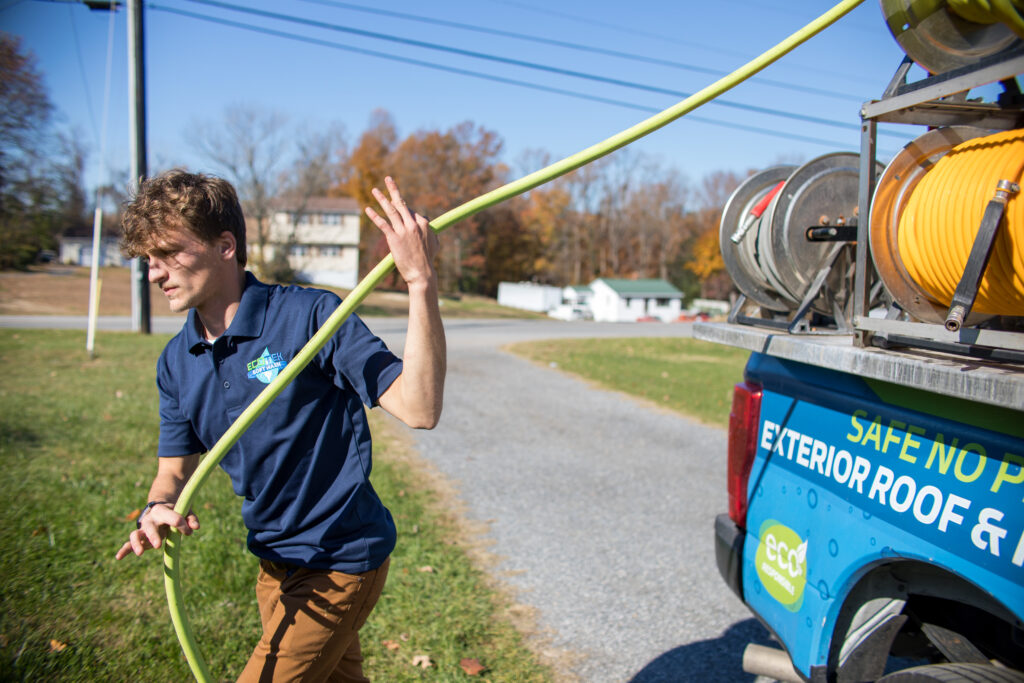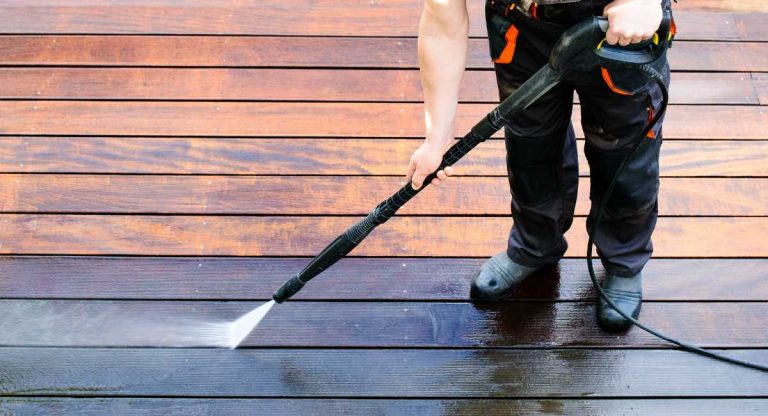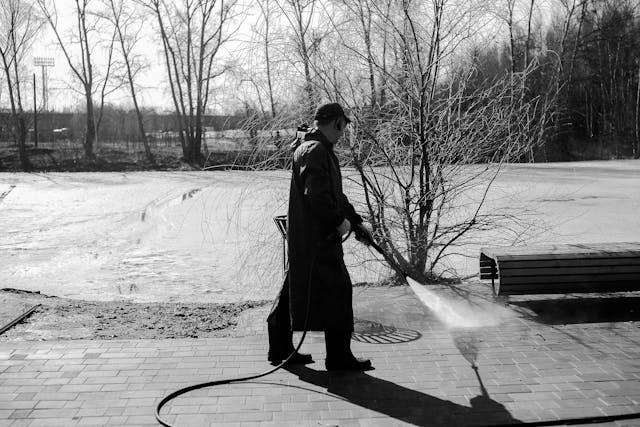
When it comes to power washing, not all jobs are created equal — and neither are the professionals who perform them. 🧼 Whether you’re a homeowner wanting a clean driveway or a business owner maintaining a storefront, the needs, expectations, and hiring process can vary significantly between residential and commercial power washing services.
So, what exactly is the difference between the two? And how do you make sure you’re hiring the right pro for the job? Let’s break it down. 💧
🏠 What is Residential Power Washing?
Residential power washing is focused on cleaning private homes and surrounding property. This might include:
- Driveways and walkways
- Siding and stucco
- Roofs and gutters
- Decks and patios
- Fences and outdoor furniture
- Pools and screened enclosures
These jobs are typically smaller in scale but require a careful, detail-oriented approach to avoid damage to materials and landscaping. 🌿
🏢 What is Commercial Power Washing?
Commercial power washing is designed for businesses and public facilities, such as:
- Restaurants, storefronts, and shopping centers
- Gas stations and parking lots
- Warehouses and loading docks
- Apartment complexes and condo buildings
- Hospitals, schools, and government buildings
These jobs are usually much larger and require a faster turnaround, professional-grade equipment, and often night or weekend scheduling to avoid business disruption.
⚙️ Key Differences in Equipment and Power
While residential services typically use high-end but portable power washers (often gas-powered or electric), commercial services rely on industrial-grade equipment, which delivers:
- Higher PSI (pounds per square inch) to tackle tough buildup
- Hot water capabilities for grease and oil
- Large surface cleaners for quick coverage
- Water reclamation systems to meet environmental codes 🌍
Commercial pressure washers may also have onboard water tanks, especially useful when municipal water isn’t accessible.
Browse Amazon Here For Commercial Pressure Washers And Accessories
🧠 Skill Level and Training
Both residential and commercial cleaners need experience — but the training focus differs:
- Residential technicians are trained in how to prevent damage to wood, siding, and painted surfaces.
- Commercial pros often deal with concrete, brick, metal, or hazardous waste — and must be OSHA compliant. 🦺
In either case, it’s important to hire someone who knows which surfaces require soft washing, which chemicals are safe, and how to avoid streaks, warping, or plant damage.
💼 Licensing and Insurance Differences
Many homeowners are satisfied with proof of general liability insurance and a basic service agreement. ✅
For commercial work, businesses usually require:
- Proof of licensing
- Worker’s compensation coverage
- COIs (Certificates of Insurance) naming the property owner
- Formal contracts and Net 30/Net 60 payment terms
If you’re a commercial property manager, hiring a contractor who isn’t properly insured could open your company up to major liability.
📋 Quote and Contract Expectations
With residential jobs, the process is typically straightforward:
- Free on-site estimate or virtual quote
- Written proposal outlining services and pricing
- Job completed within 1–2 days
- Immediate payment upon completion
For commercial power washing, the process is more formal:
- Detailed proposals with scope of work, safety protocols, and cleaning agents
- Bids may be submitted as part of RFPs (Requests for Proposals)
- Jobs may take multiple days or require off-hours work
- Billing is often done after 30 days or on invoice
If you’re a business owner, look for a company that has experience working with property managers or commercial tenants.
💬 Customer Communication
Most residential power washing companies offer direct communication between the technician or owner and the client. Homeowners like working with someone local and responsive. 📱
Commercial jobs often involve coordinating with multiple departments — property management, facilities teams, or tenant reps — so clear, timely communication is a must.
Look for providers that offer:
- Online job tracking or portals
- Contactless payment options
- Email summaries and service logs
🧼 Type of Cleaning Challenges
| Surface Type | Residential Issues | Commercial Issues |
|---|---|---|
| Siding or Paint | Chipping, discoloration | Graffiti, pollution buildup |
| Concrete | Mold, algae | Grease, oil, tire marks |
| Roofs | Moss, aging shingles | HVAC buildup, vent debris |
| Entryways | Mud, leaves | Gum, foot traffic, trash residue |
Commercial surfaces often require stronger solutions and faster execution, especially when dealing with health and safety standards.
💡 So… Which One Do You Need?
If you’re a homeowner:
Look for a locally-owned company that specializes in soft washing, deck cleaning, and roof maintenance. Ask about plant-safe detergents and whether they offer routine cleaning discounts.
If you’re a business owner or property manager:
Hire a company with commercial credentials, proof of large-scale experience, and the ability to work outside of business hours. Prioritize professionalism, insurance, and environmental compliance.
✅ Final Thoughts
While both residential and commercial power washing share the goal of clean, safe, great-looking surfaces, the tools, training, expectations, and hiring process can differ quite a bit.
Understanding these distinctions will help you hire the right company for your needs — whether you’re prepping your home for spring or restoring a 10,000 sq. ft. shopping plaza. 💦
Choose a contractor who understands your space, communicates clearly, and delivers top-tier results. 🧽
Browse Amazon Here For Commercial Pressure Washers And Accessories






